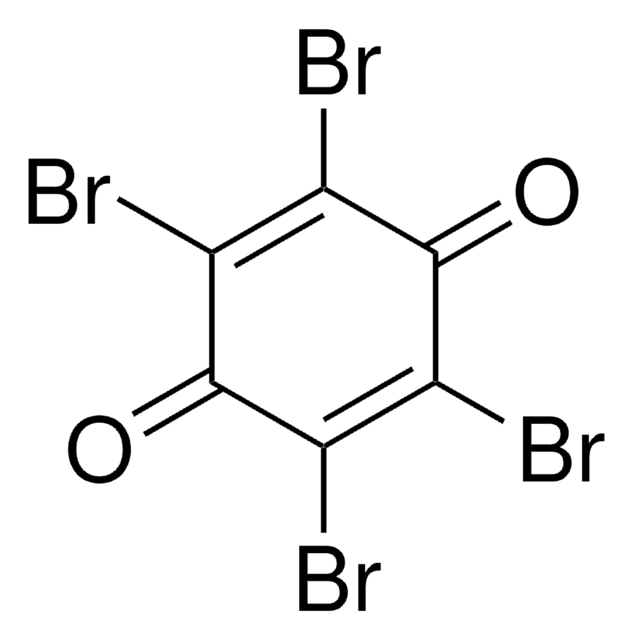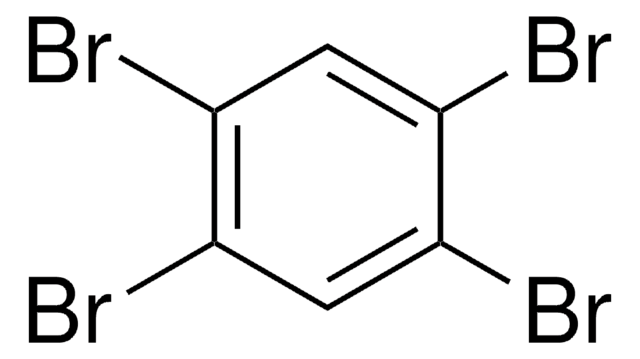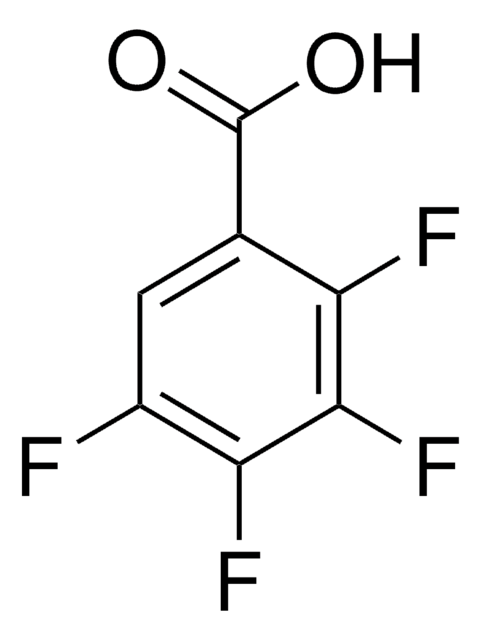All Photos(1)
About This Item
Linear Formula:
C6Br4-1,4-(OH)2
CAS Number:
Molecular Weight:
425.69
EC Number:
MDL number:
UNSPSC Code:
12352100
PubChem Substance ID:
Recommended Products
Assay
98%
mp
252-255 °C (lit.)
SMILES string
Oc1c(Br)c(Br)c(O)c(Br)c1Br
InChI
1S/C6H2Br4O2/c7-1-2(8)6(12)4(10)3(9)5(1)11/h11-12H
InChI key
DTFQULSULHRJOA-UHFFFAOYSA-N
General description
Tetrabromohydroquinone (TBHQ), also known as 2,3,5,6-tetrabromohydroquinone, can be synthesized by reacting bromanil with phenyl phosphine. It crystallizes in the monoclinic space group, P21/n. The effect of C-Br group on the crystal structure of TBHQ has been investigated. Its role in causing green luminescence in Ptychodera flava has been investigated.
Application
Tetrabromohydroquinone may be used in the synthesis of thermoresponsive branched oligoethylene glycol dendrimers.
Signal Word
Warning
Hazard Statements
Precautionary Statements
Hazard Classifications
Eye Irrit. 2 - Skin Irrit. 2 - STOT SE 3
Target Organs
Respiratory system
Storage Class Code
11 - Combustible Solids
WGK
WGK 3
Flash Point(F)
Not applicable
Flash Point(C)
Not applicable
Personal Protective Equipment
dust mask type N95 (US), Eyeshields, Gloves
Choose from one of the most recent versions:
Already Own This Product?
Find documentation for the products that you have recently purchased in the Document Library.
A comparative study of the crystal structures of tetrahalogenated hydroquinones and ?-hydroquinone.
Thalladi VR, et al.
Acta Crystallographica Section B, Structural Science, Crystal Engineering and Materials, 55(6), 1005-1013 (1999)
Mona A Abdel-Rahman et al.
European journal of medicinal chemistry, 69, 848-854 (2013-10-15)
Three interesting thermoresponsive branched oligoethylene glycol dendrimers based on tetrabromohydroquinone were efficiently synthesized from tetrabromohydroquinone and three different oligoethylene glycol derivatives. By visual inspection, all these dendrimers are water-soluble at room temperature. The thermoresponsive behaviors were investigated by using UV/vis
Akira Kanakubo et al.
Luminescence : the journal of biological and chemical luminescence, 20(6), 397-400 (2005-06-21)
2,3,5,6-Tetrabromohydroquinone was isolated as a luminous substance from Ptychodera flava. This compound emitted light after addition of hydrogen peroxide under basic conditions. Since hydroquinone had no fluorescence, further investigation by spectral analysis revealed that riboflavin was the only possible light
Reaction of phenylphosphine with p-quinones.
Pudovik AN, et al.
Russian Chemical Bulletin, 27(7), 1450-1452 (1978)
Our team of scientists has experience in all areas of research including Life Science, Material Science, Chemical Synthesis, Chromatography, Analytical and many others.
Contact Technical Service




![4,7-Dibromobenzo[c]-1,2,5-thiadiazole 95%](/deepweb/assets/sigmaaldrich/product/structures/711/964/3fd3ffd1-5916-468e-a743-22f1611b5a33/640/3fd3ffd1-5916-468e-a743-22f1611b5a33.png)




